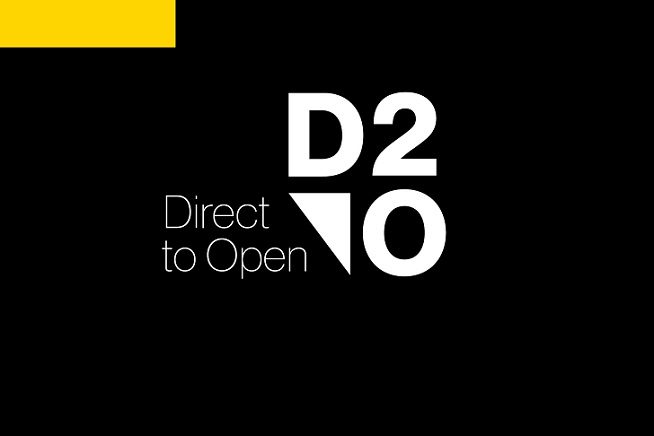 Με το μοντέλο «Direct to Open», το Massachusetts Institute of Technology, το φημισμένο ΜΙΤ, ανοίγει φέτος 82 έργα και συνεργάζεται με 322 βιβλιοθήκες.
Με το μοντέλο «Direct to Open», το Massachusetts Institute of Technology, το φημισμένο ΜΙΤ, ανοίγει φέτος 82 έργα και συνεργάζεται με 322 βιβλιοθήκες.
Το πρόγραμμα εγκαινιάστηκε το 2022 και τα στοιχεία ήδη δείχνουν ότι 322 βιβλιοθήκες θα συμμετέχουν φέτος με αποτέλεσμα περισσότερα από 160 ερευνητικά έργα (μονογραφίες) να είναι διαθέσιμα αυτά τα δύο χρόνια που τρέχει το πρόγραμμα.
Το MIT Press έχει συνάψει συμφωνίες με μεγάλους φορείς όπως με την ακαδημαϊκή κοινοπραξία των πανεπιστημίων στη Διάσκεψη των Μεγάλων Δέκα Big Ten Academic Alliance, την Κοινοπραξία Σαξονικών Πανεπιστημιακών Βιβλιοθηκών Konsortium der sächsischen Hochschulbibliotheken, το Συμβούλιο Βιβλιοθηκονόμων του Αυστραλιανού Πανεπιστημίου, το Κέντρο Ερευνητικών Βιβλιοθηκών, τη Greater Western Library Alliance, τη MOBIUS, τη μη κερδοσκοπική Jisc, τη Σύμπραξη για τη Συνεργασία και την Καινοτομία Ακαδημαϊκών Βιβλιοθηκών, την Κοινοπραξία βιβλιοθηκών της Καλιφόρνια Statewide California Electronic Library Consortium και αρκετούς ακόμα.
Η ανοιχτή σε όλους επιστήμη και έρευνα είναι ένα μεγάλο στοίχημα της εποχής, το οποία δίχως τη συνεργασία των βιβλιοθηκών και κοινοπραξιών δεν μπορεί να υλοποιηθεί. Η ανοιχτή πρόσβαση, όπως αποδεικνύει το Direct to Open του MIT είναι αναγκαία να επεκταθεί ακόμα περισσότερο.
“Το D2O (Direct to Open) αξιοποιεί τη συλλογική δύναμη των βιβλιοθηκών για την υποστήριξη της ανοιχτής και δίκαιης πρόσβασης σε ζωτικής σημασίας, κορυφαίες υποτροφίες. Αναπτύχθηκε σε διάστημα δύο ετών με τη γενναιόδωρη υποστήριξη του Arcadia Fund, σε στενή συνεργασία με την κοινότητα των βιβλιοθηκών. Ανοίγει την πρόσβαση σε νέες επιστημονικές μονογραφίες και επεξεργασμένες συλλογές του MIT Press (80-90 τίτλοι ετησίως) από το 2022 μέσω επαναλαμβανόμενων τελών συμμετοχής. Παρέχει στις συμμετέχουσες βιβλιοθήκες πρόσβαση σε οπίσθιες λίστες/αρχεία (~2.500 τίτλους), οι οποίες διαφορετικά θα ήταν περιορισμένες. Καλύπτει μερικές άμεσες δαπάνες για τη δημοσίευση έργων υψηλής ποιότητας που είναι επίσης διαθέσιμα για έντυπη αγορά. Ένα επιπλέον όφελος για τις συμμετέχουσες βιβλιοθήκες είναι η σημαντική έκπτωση στη συλλογή βιβλίων MIT Press Trade στην πλατφόρμα Direct“, αναφέρει χαρακτηριστικά το MIT
Ο κατάλογος των έργων που άνοιξαν το 2023 καλύπτει ένα μεγάλο φάσμα θεμάτων, από τον σεξισμό, τον ρατσισμό, τα δικαιώματα των παιδιών, τη διατροφή, μέχρι τη δημοκρατία στην εργασία, το περιβάλλον, τις φυσικές καταστροφές, τους πολέμους, τις εξεγέρσεις.
Μονογραφίες και συλλογές που άνοιξαν το 2023 (ενδεικτικά)
¡Alerta!: Engineering on Shaky Ground by Elizabeth Reddy
Academic Star Wars: Excellence Initiatives in Global Perspective edited by Maria Yudkevich, Philip G. Altbach, and Jamil Salmi
After Eating: Metabolizing the Arts by Lindsay Kelley
Algorithmic Rights and Protections for Children edited by Mizuko Ito, Remy Cross, Karthik Dinakar, and Candice Odgers
Art + DIY Electronics by Garnet Hertz
Athena Unbound: Why and How Scholarly Knowledge Should Be Free for All by Peter Baldwin
Balkan Cyberia: Cold War Computing, Bulgarian Modernization, and the Information Age behind the Iron Curtain by Victor Petrov
The Brain in Motion: From Microcircuits to Global Brain Function by Sten Grillner
Catastrophes, Confrontations, and Constraints: How Disasters Shape the Dynamics of Armed Conflicts by Tobias Ide
Computational Formalism: Art History and Machine Learning by Amanda Wasielewski
Constructing Student Mobility: How Universities Recruit Students and Shape Pathways between Berkeley and Seoul by Stephanie K. Kim
Context Changes Everything: How Constraints Create Coherence by Alicia Juarrero
Cracking the Bro Code by Coleen Carrigan
Creative Hustling: Women Making and Distributing Films from Nairobi by Robin Steedman
Cryptographic City: Decoding the Smart Metropolis by Richard Coyne
Dare to Invent the Future: Knowledge in the Service of and through Problem-Solving by Clapperton Chakanetsa Mavhunga
Data and Democracy at Work: Advanced Information Technologies, Labor Law, and the New Working Class by Brishen Rogers
Data Paradoxes: The Politics of Intensified Data Sourcing in Contemporary Healthcare by Klaus Hoeyer
Demystifying the Academic Research Enterprise: Becoming a Successful Scholar in a Complex and Competitive Environment by Kelvin K. Droegemeier
Design Aesthetics: Theoretical Basics and Studies in Implication by Mads Nygaard Folkmann
Design, Empathy, Interpretation: Toward Interpretive Design Research by Ilpo Koskinen
Distant Viewing: Computational Exploration of Digital Images by Taylor Arnold and Lauren Tilton
Distributional Reinforcement Learning by Marc G. Bellemare, Will Dabney, and Mark Rowland
Evolution “On Purpose”: Teleonomy in Living Systems edited by Peter A. Corning, Stuart A. Kauffman, Denis Noble, James A. Shapiro, Richard I. Vane-Wright, and Addy Pross
Evolvability: A Unifying Concept in Evolutionary Biology? edited by Thomas F. Hansen, David Houle, Mihaela Pavličev, and Christophe Pélabon
Exploring and Exploiting Genetic Risk for Psychiatric Disorders edited by Joshua A. Gordon and Elisabeth B. Binder
Families on the Edge: Experiences of Homelessness and Care in Rural New England by Elizabeth Carpenter-Song
Forecasting Travel in Urban America: The Socio-Technical Life of an Engineering Modeling World by Konstantinos Chatzis
From ASCII Art to Comic Sans: Typography and Popular Culture in the Digital Age by Karin Wagner
From Geometry to Behavior: An Introduction to Spatial Cognition by Hanspeter A. Mallot
Global Shifts: Business, Politics, and Deforestation in a Changing World Economy by Philip Schleifer
Gradient Expectations: Structure, Origins, and Synthesis of Predictive Neural Networks by Keith L. Downing
The Infrastructural South: Techno-Environments of the Third Wave of Urbanization by Jonathan Silver
Insolvent: How to Reorient Computing for Just Sustainability by Christoph Becker
Inventing the Working Parent: Work, Gender, and Feminism in Neoliberal Britain by Sarah E. Stoller
Just in Time: Temporality, Aesthetic Experience, and Cognitive Neuroscience by G. Gabrielle Starr
Kids Across the Spectrums: Growing Up Autistic in the Digital Age by Meryl Alper
Living with Algorithms: Agency and User Culture in Costa Rica by Ignacio Siles
Mainstreaming and Game Journalism by David B. Nieborg and Maxwell Foxman
Making Meaning with Machines: Somatic Strategies, Choreographic Technologies, and Notational Abstractions through a Laban/Bartenieff Lens by Amy LaViers and Catherine Maguire
Managing Meaning in Ukraine: Information, Communication, and Narration since the Euromaidan Revolution by Göran Bolin and Per Ståhlberg
May We Make the World?: Gene Drives, Malaria, and the Future of Nature by Laurie Zoloth
Media Ruins: Cambodian Postwar Media Reconstruction and the Geopolitics of Technology by Margaret Jack
Milk and Honey: Technologies of Plenty in the Making of a Holy Land by Tamar Novick
More Than a Health Crisis: Securitization and the US Response to the 2013–2016 Ebola Outbreak by Jessica Kirk
Nature-Made Economy: Cod, Capital, and the Great Economization of the Ocean by Kristin Asdal and Tone Huse
No Heavenly Bodies: A History of Satellite Communications Infrastructure by Christine E. Evans and Lars Lundgren
On Linearization: Toward a Restrictive Theory by Guglielmo Cinque
On the Brink of Utopia: Reinventing Innovation to Solve the World’s Largest Problems by Thomas Ramge and Rafael Laguna de la Vera
Open Minded: Searching for Truth about the Unconscious Mind by Ben R. Newell and David R. Shanks
Ownership of Knowledge: Beyond Intellectual Property edited by Dagmar Schäfer, Annapurna Mamidipudi, and Marius Buning
Parody in the Age of Remix: Mashup Creativity vs. the Takedown by Ragnhild Brøvig
The Perception Machine: Our Photographic Future between the Eye and AI by Joanna Zylinska
Person, Thing, Robot: A Moral and Legal Ontology for the 21st Century and Beyond by David J. Gunkel
The Phoenix Complex: A Philosophy of Nature by Michael Marder
Picture Research: The Work of Intermediation from Pre-Photography to Post-Digitization by Nina Lager Vestberg
Picture-Work: How Libraries, Museums, and Stock Agencies Launched a New Image Economy by Diana Kamin
A Place for Science and Technology Studies: Observation, Intervention, and Collaboration by Jane Calvert
Playing Oppression: The Legacy of Conquest and Empire in Colonialist Board Games by Mary Flanagan and Mikael Jakobsson
Principles of Knowledge Auditing: Foundations for Knowledge Management Implementation by Patrick Lambe
Prison Media: Incarceration and the Infrastructures of Work and Technology by Anne Kaun and Fredrik Stiernstedt
Properties of Life: Toward a Theory of Organismic Biology by Bernd Rosslenbroich
Rational Accidents: Reckoning with Catastrophic Technologies by John Downer
Real Life in Real Time: Live Streaming Culture edited by Johanna Brewer, Bo Ruberg, Amanda L. L. Cullen, and Christopher J. Persaud
Recycling Class: The Contradictions of Inclusion in Urban Sustainability by Manisha Anantharaman
Repairing Play: A Black Phenomenology by Aaron Trammell
The Science-Music Borderlands: Reckoning with the Past and Imagining the Future edited by Elizabeth H. Margulis, Psyche Loui, and Deirdre Loughridge
Selling the American People: Advertising, Optimization, and the Origins of Adtech by Lee McGuigan
The Sensorium of the Drone and Communities by Kathrin Maurer
Sewer of Progress: Corporations, Institutionalized Corruption, and the Struggle for the Santiago River by Cindy McCulligh
The Space between Look and Read: Designing Complementary Meaning by Susan M. Hagan
The Stuff Games Are Made Of by Pippin Barr
Tactical Publishing: Using Senses, Software, and Archives in the Twenty-First Century by Alessandro Ludovico
To Know Is to Compare: Studying Social Media across Nations, Media, and Platforms by Mora Matassi and Pablo J. Boczkowski
Undue Hate: A Behavioral Economic Analysis of Hostile Polarization in US Politics and Beyond by Daniel F. Stone
The Unequal Effects of Globalization by Pinelopi Koujianou Goldberg with Greg Larson
The Videogame Industry Does Not Exist: Why We Should Think Beyond Commercial Game Production by Brendan Keogh
A Woman’s Right to Know: Pregnancy Testing in Twentieth-Century Britain by Jesse Olszynko-Gryn
War on All Fronts: A Theory of Health Security Justice by Nicholas G. Evans
What Makes Us Social? by Chris Frith and Uta Frith
Winds of Doctrine: Studies in Contemporary Opinion by George Santayana, David E. Spiech, Martin A. Coleman, and Faedra Lazar Weiss
Women and Climate Change: Examining Discourses from the Global North by Nicole Detraz









